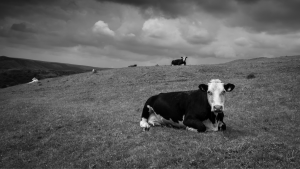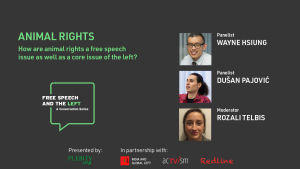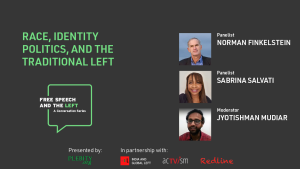
Every day we learn more about our home planet’s fascinating cohabitants: we know that mother pigs sing to their piglets while nursing; we know that chickens form complex social hierarchies; we know that dolphins have the longest memories in the animal kingdom; we know that birds can sing a wide range of complex songs, each with its own specific meaning; we know that when a goose’s mate dies, its partner will remove themselves from the flock and mourn for life.
We know more about non-human animals than ever before. We also know more about the impact our actions have on the environment, with scientists repeatedly warning us of all the ways we are destroying the planet, though their clarion calls are often met with deafening silence. With the pandemic, we also now know more about how zoonotic diseases are intimately linked to our own consumption habits.
Profiteers want to maintain the illusion that humans exist in complete separation from nature, regurgitating the notion that humans are at the top of the animal chain. This is speciesism at work and it is propagated under the tenets of neocolonialism—it’s an attempt to strip ourselves from where we once originated, to remove ourselves from our commonalities between other species and the interconnectedness of all living things. The ability to coexist in a world with other living beings requires a delicate, but measured balance, and a gentle pull of the thread can offset the balance, and topple even the most seemingly stable systems. Humankind has irreversibly tipped the scales, creating a permanent imbalance across the entire planet, and far into space.
Early on in the pandemic, a surge of commentary emerged with many predicting that the pandemic would be the thing to finally shift our consciousness. Relieved, I thought, people are finally reflecting on their consumption habits. I wasn’t the only one who held out hope: others saw this period as an opportunity for change, too. In an op-ed, renowned environmentalist David Suzuki wrote, “In this disaster lies an opportunity to reflect and change direction in the hope that if we do, nature will be far more generous than we deserve.”
And just for a moment, it did seem like a shift was happening. And it was happening in a big way.
In 2020, investments in plant-based proteins reached a record-breaking $3.1 billion—exceeding capital invested in 2019 by threefold. Globally, the plant-based protein sector is worth $20.7 billion and is expected to grow to $23.2 billion by 2024. 2020 was dubbed a ‘breakout year for plant-based proteins.’ The rise in popularity of plant-based proteins is proof that there is a market for non-animal derived protein.
The general plant-based market is expected to reach $74.2 billion by 2027. Lab-grown meat is already available for public consumption in select areas, and is slated for wider release in the coming years. Seeing an opportunity to make more money, fast food chains like Burger King are also committing to providing more plant-based options. Meanwhile, China, one of the few remaining countries to require animal testing for beauty products recently ended its mandatory pre-market animal testing requirements for imported general cosmetics. These are just a few of the trends that seem to skew in favor of plant-based alternatives, but unfortunately, they only tell part of the story.
The story is much bleaker.
Sure, more people may be trying plant-based products (and boasting about it), but turns out Meatless Mondays and weekly veggie burgers just aren’t making much of a difference.
Not only has the status quo all but returned, but countries around the world are ramping up production at faster rates to make up for lost time. The same applies for animal exploitation.
A recent report conducted by Packaged Facts found that worldwide meat consumption is on the rise and is expected to increase 1.4 percent per year through 2023. In Africa and the Middle East, meat consumption is expected to rise at a faster rate due to higher living standards and rise of income levels. In the US, meat consumption increased by 40 percent between 1961 and 2017, and it is expected to rise another 1 percent each year through 2023.
To add insult to injury, fast food chains are surging in popularity in developing countries, with corporations selling fast food to consumers who see fast food as a symbol of wealth and freedom. The global fast food market is expected to reach over $930 billion by 2027, with China, India and Brazil dominating fast food consumption. Western societies have long reached the ‘saturation point’ according to advertisers. In other words, they’re not as profitable anymore, so corporations are hungry to further exploit the already-exploited.
In the West, some people may claim to not eat meat at all, or they may want to eat less of it, but they’ll stop short of actually abstaining altogether. They’ll even lie about it to make themselves feel better. The University of Guelph found that many surveys show that respondents who identified as vegans or vegetarians are actually not vegetarian or vegan at all. They found that one-third of those who identified as vegetarians and more than half of those who identified as vegans ate meat “relatively regularly.” The university researchers believe respondents lied out of social pressure to conform, and not out of any ethical or environmental concern.
In other cases, people have shown themselves to be more transparent about their unwillingness to change their habits when they’re presented with other options. The world’s largest ever opinion poll on climate change jointly conducted by the United Nations Development Programme (UNDP) and Oxford University in over 50 countries, found that most people were not willing to switch to a plant-based diet to reduce their environmental impact, despite overwhelming evidence that a plant-based diet is one of the most significant ways we can reduce greenhouse gas emissions. Respondents were, however, more willing to reduce greenhouse gases through policies such as forest and land conservation and investment in renewable resources. Both of these policies conveniently put the onus on governments and companies to change, and not people themselves. This begs the question: how can we expect profit-driven, exploitative corporations to comply with our demands, when we’re not even willing to modify our own habits for the sake of the greater good?
Even when faced with existential threat, consumers are still unwilling to budge on their diets, but they are all too happy to point the finger in the other direction, recusing them of any responsibility. This finger-pointing reminds me of the environmental groups I’ve been a part of: they throw up banners, tweet their representatives, and walk across bridges—actions that only delay the inevitable, while discounting any personal responsibility they have in climate action. In my conversations with them, many argue that it is the companies who should be making sacrifices, not them—as if the two are mutually exclusive.
COVID-19 was the direct result of our insatiable desire to consume things that should not be consumed. Amid the pandemic, some people tried to bring up these issues, but they were quickly dismissed as being racist and told to ‘do better!’ quashing all potential conversation. Cultural relativism and a self-censorious populace have removed any possibility for the truly difficult conversations to be had. Naturally, any conversation about animal consumption has all but dissipated, while the epoch of destruction continues, uninterrupted in the Anthropocene era.
Life has plummeted in ways previously thought unimaginable: from the ecological to the moral to the intellectual. Our desire to sate our curiosity is rarely a neutral act; it requires pulling nature apart and extracting only the resources we want, draining other living things of the habitats they need for survival.
Animal exploitation remains one of the greatest silent tragedies of our time. And it continues unabated—in farms, labs, factories, slaughterhouses, zoos, schools, and in the comfort of our own homes.
We lend our thoughts and prayers after every tragedy, create mantras for every cause, point fingers to every wrongdoer, and then we move on to the next trending cause, without so much as a second look back. As Camus noted, “a man without ethics is a wild beast loosed upon himself.” Without ethics, social order crumbles.




